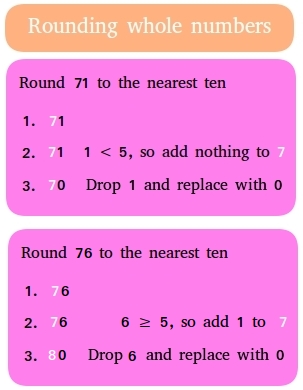Rounding Whole Numbers
Rounding whole numbers is the process by which we make numbers look a little nicer. The numbers that look nice in our mind are numbers that usually end with a zero such as 10, 30, 200. Therefore, when rounding numbers, it usually means that you are going to try to put zero(s) at the end.
Learn to Round Whole Numbers
Understanding Rounding:
Select whether you want to round to the nearest ten, hundred, or thousand. The number line will help us visualize the distances.
Quiz Complete!
Your final score: 0/10
There is another simple method for rounding whole numbers to the nearest ten, hundred, thousand, ten-thousand, and so forth...
We do so by focusing on digits.
How to Round Whole Numbers by Focusing on Digits
Study the two examples in the figure below carefully and then keep reading in order to get a deeper understanding.

Rounding Whole Numbers to the Nearest Ten
When rounding to the nearest ten, if the last digit ends with 1, 2, 3, or 4, round to the next number that is smaller than the number given and ending with a zero.
For instance, round 43 to the nearest ten.The last digit is 3, so the next number smaller than 43 with an ending of zero is 40.
On the other hand, If the last digit is 5, 6, 7, 8, or 9, round to the next number bigger than the given number and ending with zero.
For instance, round 45 to the nearest ten. The last digit is 5, so the next number bigger than 45 and ending with zero is 50.
Other examples
Round 23, 36, 55, and 99.
- For 23, the last digit is 3, so the answer is 20.
- For 36, the last digit is 6, so the answer is 40.
- For 55, the last digit is 5, so the answer is 60.
- For 99, the last digit is 9, so the answer is 100.
Rounding to the Nearest Hundred
When rounding to the nearest hundred, you will need to look at the last two digits. If the last two digits is 49 or less round to the next number that is smaller than the number given and ending with two zeros.
For instance, round 549 to the nearest hundred.The last two digits is 49, so the next number smaller than 549 with an ending of two zeros is 500.
On the other hand, If the last two digits is 50 or more, round to the next number bigger than the given number and ending with two zeros.
For instance, round 865 to the nearest hundred. The last two digits is 65 and 65 is bigger than 50, so the next number bigger than 865 and ending with two zeros is 900.
Other examples
Round 648, 121, 950, and 351.
- For 648, the last two digits is 48, so the answer is 600.
- For 121, the last two digits is 21, so the answer is 100.
- For 950, the last two digits is 50, so the answer is 1000.
- For 351, the last two digits is 51, so the answer is 400.
Rounding Whole Numbers to the Nearest Thousand
When rounding to the nearest thousand, you will need to look at the last three digits. If the last three digits is 449 or less round to the next whole number that is smaller than the number given and ending with three zeros.
For instance, round 2437 to the nearest hundred.The last three digits is 437, so the next whole number smaller than 2437 with an ending of three zeros is 2000.
On the other hand, If the last three digits is 500 or more, round to the next number bigger than the given number and ending with three zeros.
For instance, round 7500 to the nearest thousand. The last three digits is 500, so the next whole number bigger than 7500 and ending with three zeros is 8000.
Other examples
Round 1648, 1121, 3950, and 9351
For 1648, the last three digits is 648, so the answer is 2000.
For 1121, the last three digits is 121, so the answer is 1000.
For 3950, the last three digits is 950, so the answer is 4000.
For 9351, the last three digits is 351, so the answer is 9000.
When rounding whole numbers to a number smaller than the given number, we can also say that we are rounding down.
When rounding whole numbers to a number bigger than the given number, we can also say that we are rounding up.
Rounding whole numbers to the nearest ten-thousand
If the last 4 digits is bigger than 5000, round up. Otherwise, round down.
Rounding to the nearest hundred-thousand
If the last 5 digits is bigger than 50000, round up. Otherwise, round down.
Rounding to the nearest million
If the last 6 digits is bigger than 500000, round up. Otherwise, round down.